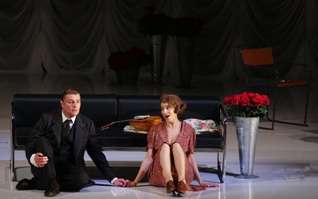|
Back
Happiness Versus the Memory of Happiness Milano
Teatro alla Scala
05/28/2019 - & May 31, June 3, 7, 10, 14, 17*, 2019
Erich Wolfgang Korngold: Die tote Stadt, opus 12
Klaus Florian Voigt (Paul), Asmik Grigorian (Marietta), Markus Werba (Frank/Pierrot), Cristina Damian (Brigitta), Marika Spadafino (Juliette), Sascha Emanuel Kramer (Count Albert, Gaston), Daria Cherniy (Lucienne), Sergei Ababkin (Victorin), Hwan An (A voice)
Coro del Teatro alla Scala, Coro di Voci Bianche dell’Accademia Teatro alla Scala, Bruno Casoni (Chorus Master), Orchestra del Teatro alla Scala, Alan Gilbert (conductor)
Graham Vick (Staging), Stuart Nunn (Sets & costumes), Giuseppe di Iorio (Lighting), Ron Howell (Choreography)

K. F. Vogt, A. Grigorian (© Brescia/Amisano - Teatro alla Scala)
“Rien n’empêche le bonheur comme le souvenir du bonheur” (“Nothing prevents happiness more than the memory of happiness”), surmises a woman to Karim, the protagonist of French novelist Gilbert Sinoué’s novel Les Nuits du Caire. Happiness versus the memory of happiness is the gist of Korngold’s most famous opera, written in 1920 Vienna by the 24-year-old prodigy.
How realistic is it to look forward when the recent past is too magnificent to forget. This was perhaps the predicament of the Viennese intellectual elite after the collapse of the Austro-Hungarian Empire following WWI. This was especially so after the rise of Nazism and the persecution of many members of the intelligentsia, be they socialist, anarchist, homosexual or Jewish. Many elements of Western modernity, be they in music (Schoenberg, Webern, Berg, Mahler, Zemlinsky), painting (Klimt, Kokoschka), psychology (Freud), philosophy (Wittgenstein), literature (Zweig, Schnitzler) and witticism (Karl Kraus) were achieved in secular, cosmopolitan and open Vienna. The vanishing of this golden age of human achievement was too much to bear for many. In the face of an ever bleaker world, the great Viennese writer Stefan Zweig opted for suicide in exile. Given the composer’s epoch, nationality and Jewish faith, such a premise is fecund ground for creative and innovative stagings of Die tote Stadt. Evoking some of this background, Graham Vick’s conception at the performance I attended was only partially successful. The sets were interesting: the temple Paul built in memory of his dead wife, Marie, is a morbid hybrid between a Catholic saint’s reliquiario and a showroom in a contemporary funeral home: a wall with her photos, a glass cabinet with her lyre, her dress and a lock of her blonde hair, and a monitor playing videos of his cherished widow. The video projections, though anachronistic, were effective.
The two leads were ideally suited. Both Paul and Marietta have their roles, sometimes uncomfortably, in the high register. Save for some passages, Wagner tenor Klaus Florian Vogt had ease with this high tessitura. Lithuanian soprano Asmik Grigorian was magnificent as Marietta: total ease with the high notes, an agreeable fresh timbre and excellent stage presence and acting. Her Act I aria “Glück, das mir verblieb” was sensual and appropriately haunting. Marietta, the “doppelganger” of Paul’s widow Marie, is a dancer of modest background. Unfortunately, Graham Vick chose to make her into an uninhibited, oversexed Tomboy. This was brilliantly portrayed by Grigorian who is an astounding actress. Paul, who must have been a sensitive romantic man to excessively venerate his widow, was portrayed as dour and severe. This too was convincingly conveyed by Vogt. However, the likelihood of the two protagonists being attracted to each other, as conceived by Vick’s stage directions, is minute.
The second act is basically Paul’s dream of Marietta’s performance. Her dance number is transformed into a lewd cabaret act, and her companions, cross dressers, sadists and masochists. Pierrot, dressed as a Nazi officer, participates in the debauchery. We can thus presume the action was changed to Nazi-occupied Belgium. In the third act, there is a religious procession in town being discreetly watched by Paul from his window. Austere Flemish Catholicism is gratuitously intertwined with Nazism: bishops, priests and fervent believers rub shoulders with Nazi officers. The celebration degenerates into an orgy of terror where Jews are brutalized. Bruges, the dead city, is bleak enough without evoking Nazis. Such liberal exploitation of suffering cheapens the memories of the actual victims and is unrelated to the plot. It only distracts from the intensity of the untenable relationship between Paul and a woman he loves for her resemblance to another.
Amazingly, this was La Scala’s first ever production of Korngold’s opera, and for this, the theatre must be lauded. Moreover, it was ideally cast with Grigorian and Vogt giving excellent performances. Smaller roles were well sung, especially Markus Werba as Paul’s friend Franz and Pierrot. His interpretation of the Act 2 aria “Mein Sehnen, mein Wähnen” was exemplary, sung with lyricism and refinement worthy of Lieder. Alan Gilbert conducted La Scala’s orchestra with gusto, emphasizing the lyricism of the work. Unfortunately, it is doubtful that this staging would win Korngold many additional fans.
Ossama el Naggar
|